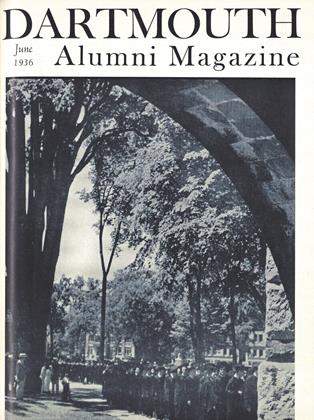By Troyer Steele Anderson '22. Oxford University Press, New York and London, 1936.
Notwithstanding the countless books which have been written concerning the American Revolution it is surprising that so little attention has been given to the higher strategy of the military operations of the war, and this is especially true as regards the British side of the picture. There was no lack of acrimonious controversy surrounding the British conduct of the war at the time, occasioned by a desire either to fix or to evade responsibility for defeat. Sir William Howe, Sir Henry Clinton, and Lord Cornwallis were the storm centers of discussion and their differences have become notorious. Various superficial explanations have been advanced to actount for the dismal failure of Howe's efforts to put down the rebellion, one of the most common being to the effect that he secretly sympathized with the Americans and hoped, by avoiding a too vigorous campaign against them, to pave the way for reconciliation. Support for this view seemed to be afforded by the fact that Sir William, along with his brother Lord Richard, the admiral, who was appointed to the naval command in America, bore commissions empowering them to negotiate for peace.
In this volume, Professor Anderson has undertaken a thoroughgoing study of the command of the two brothers in their respective military and naval spheres, in an effort to discover the nature of the powers which they exercised, the principles underlying their strategy, the character of their leadership, and the real reasons for their failure. The results of his investigation constitute the most authentic treatment of the British high command during the years 1776 and 1777 which has yet appeared.
The early chapters deal with the foundations of British military policy during the Revolution, and are followed by a discussion of the operations around Boston, in which General Howe played a prominent part. The main body of the volume is devoted to an analysis of Howe's campaigns in New York, New Jersey, and Pennsylvania in 1776 and 1777, and to a study of the activities of the brothers as peace commissioners. In conclusion, there is a discussion of the reasons for British failure, which the author attributes, not to lack of sincerity in Howe's efforts, but to the difficulties inherent in his task, the inadequacy of the means at his disposal, and to the fact that his leadership was dominated by certain "routine ideas." Professor Anderson goes far beyond the conventional methods of military historians and endeavors to penetrate the psychology of the British leaders, as revealed by contemporary documents. He refuses to accept without question the conventional explanations of British failure and formulates and examines many alternative hypotheses suggested by the evidence.
An outstanding feature of the volume consists in its exceedingly wide use of new documentary material and scholars interested in this field will turn eagerly to the bibliographical essay which is a distinct contribution to the literature of the American Revolution. Among the materials examined, especial mention should be made of the papers of Sir Henry Clinton and Lord George Germain, recently acquired by the William L. Clements Library at Ann Arbor, Michigan. The vast collections in the Public Record Office in London and in other British repositories have also been carefully examined. It is probable that this volume will mark the beginning of a new trend in the study of the American Revolution and in conclusion, one cannot refrain from expressing the hope that Professor Anderson may himself see fit to apply his original method to the study of the latter phase of the Revolutionary conflict, centering, on the British side, around the personalities of Sir Henry Clinton and Lord Cornwallis.
 View Full Issue
View Full Issue
More From This Issue
-
 Article
ArticleSOCIAL SURVEY REPORT
June 1936 By The Editors -
 Class Notes
Class NotesClass of 1935
June 1936 By William W. Fitzhugh Jr. -
 Class Notes
Class NotesClass of 1929
June 1936 By F. William Andres -
 Class Notes
Class NotesClass of 1911
June 1936 By Prof. Nathaniel G. Burleigh -
 Article
ArticleTHE SONS AND DAUGHTERS OF '79
June 1936 By Clifford Hayes Smith -
 Class Notes
Class NotesClass of 1934
June 1936 By Martin J. Dwyer Jr.
Wayne E. Stevens
-
 Lettter from the Editor
Lettter from the EditorDartmouth Manuscript Series—The First Volume
MARCH 1932 -
 Books
BooksFACULTY PUBLICATIONS
March, 1926 By Wayne E. Stevens -
 Books
BooksDEMOCRACY FIGHTS: A HISTORY OF NEW HAMPSHIRE IN WORLD WAR II
May 1951 By WAYNE E. STEVENS -
 Books
BooksMYTHS AND REALITIES: SOCIETIES OF THE COLONIAL SOUTH.
December 1952 By Wayne E. Stevens -
 Books
BooksIMPACT: THE BATTLE STORY OF THE TENTH ARMORED DIVISION.
July 1954 By WAYNE E. STEVENS -
 Books
BooksTHE GOVERNOR AND THE REBEL.
June 1958 By WAYNE E. STEVENS
Books
-
 Books
BooksThe issue of Modern Philology
January, 1931 -
 Books
BooksBriefly Noted
APRIL 1970 -
 Books
BooksTHE NORTHWEST FUR TRADE
November 1928 By A. H. B. -
 Books
BooksTHE FALL OF SAIGON
June • 1985 By David Bowman '63 -
 Books
BooksNOT FOR HYPOCHONDRIACS WE TAKE TO BED
April 1931 By Herbert F. West -
 Books
BooksOLD GEORGE
March 1941 By Royal C.Nemiah.

